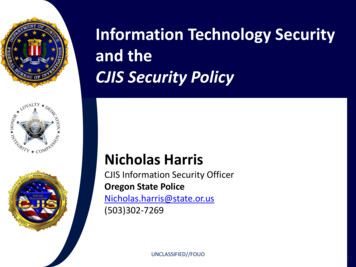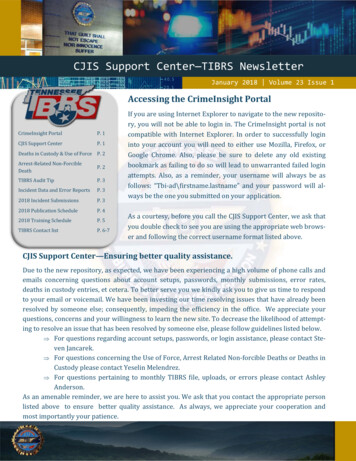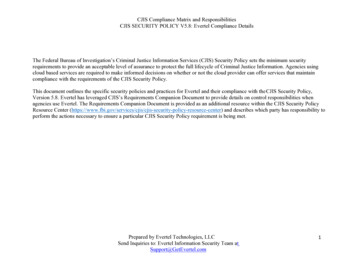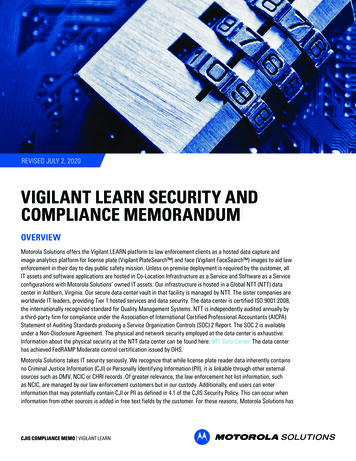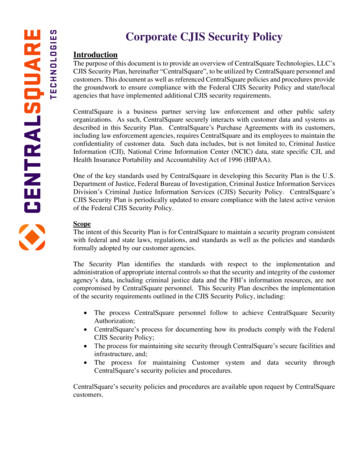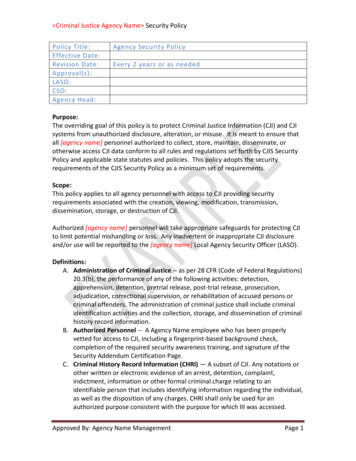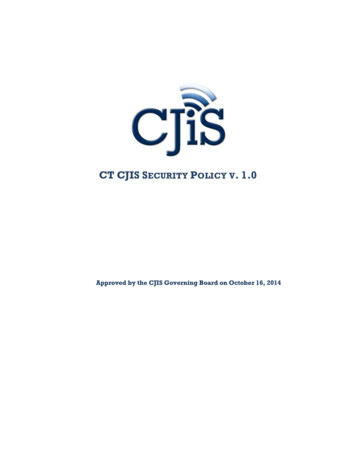
Transcription
CT CJIS SECURITY POLICY V. 1.0Approved by the CJIS Governing Board on October 16, 2014
CT CJIS Security Policy v. 1.0Prepared by the CT CJIS Security Workgroup:Phil ConenDavid DoveChris DuryeaJames HarrisDarryl HayesJohn RussottoSean ThakkarTerry WalkerSteven WallickAntoinette WebsterForCT Criminal Justice Information System (CJIS)55 Farmington Avenue11th FloorHartford, CT 06105-3725
CT CJIS Security PolicyTable of ContentsTable of Contents1.Executive Summary . 72.Introduction . 83.4.2.1.Purpose .82.2.Scope .82.3.Relationship to Local Security Policy and Other Policies .82.4.Administration .92.5.Distribution of the CT CJIS Security Policy .9The CT CJIS Security Policy Approach . 103.1.CT CJIS Security Policy Vision Statement .103.2.Architecture Independent .103.3.Risk versus Realism .10Roles and Responsibilities . 114.1.Roles and Responsibilities for Agencies and Parties .114.1.1.CJIS Governing Board .114.1.2.CJIS Executive Director .114.1.3.CT Terminal Agency Coordinator (TAC) .124.1.4.Criminal Justice Agency (CJA) .124.1.5.Noncriminal Justice Agency (NCJA) .124.1.6.CJIS Information Security Officer .124.1.7.CISS Administrator .134.1.8.Local Agency Security Officer .134.1.9.CISS Community Agency Administrator .135.CISS State Data and Personally Identifiable Information . 145.1.CISS State Data.145.1.1.CISS State Data Sources .145.2.Access, Use and Dissemination of CISS State Data .155.2.1.Storage .155.3.6.Commercial Distribution of CISS State Data.15Policy and Implementation . 166.1.Policy Area 1: Information Exchange Agreements .166.1.1.Information Exchange .166.1.2.Connecticut Justice Information System Security Compliance Assessment Form (CT CJIS-2) .176.1.3.Connecticut Justice Information System Security Compliance Certification Form (CT CJIS-3) .176.1.4.Secondary Dissemination .176.2.Policy Area 2: Security Awareness Training .176.2.1.Awareness Topics.176.2.2.Security Training Records .19Page 3
CT CJIS Security PolicyTable of Contents6.3.Policy Area 3: Incident Response .196.3.1.Reporting Information Security Events .196.3.2.Incident Response Training .206.3.3.Incident Monitoring .206.4.Policy Area 4: Auditing and Accountability.206.5.Policy Area 5: Access Control .206.5.1.Account Management .206.5.2.Access Enforcement .216.5.3.Unsuccessful Login Attempts to the CISS Portal .226.5.4.System Use Notification .226.5.5.Session Lock .226.6.Policy Area 6: Identification and Authentication .236.6.1.Identification Policy and Procedures .236.6.2.Authentication Policy and Procedures .246.7.Policy Area 7: Configuration Management .246.7.1.Access Restrictions for Changes .246.7.2.Security of Configuration Documentation.256.8.Policy Area 8: Media Protection .256.8.1.Media Storage and Access.256.8.2.Media Transport .256.8.3.Electronic Media Sanitization and Disposal .266.8.4.Disposal of Physical Media .266.9.Policy Area 9: Physical Protection .266.10. Policy Area 10: System and Information Integrity Policy and Procedures .266.10.1.Patch Management .266.10.2.Malicious Code Protection .276.10.3.Spam and Spyware Protection .276.11. Policy Area 11: Formal Audits .276.11.1.Audits by the CT CJIS.276.11.2.Special Security Inquiries and Audits .286.12. Policy Area 12: Personnel Security .286.12.2.Personnel Termination.286.12.3.Personnel Transfer .286.12.4.Personnel Sanctions .29Appendix I.Wireless Access Best Practices . 30Appendix II.Security Incident Response . 33Appendix III. Non-Disclosure Agreements for Consultants . 34Appendix IV. Sample Incident Notification Report . 36Appendix V.CT CJIS Security Compliance Assessment Form (CJIS-2) . 37Appendix VI. CT CJIS Security Compliance Certification Form (CJIS-3) . 43Appendix VII.Page 4System Use Notification. 47
CT CJIS Security PolicyAppendix VIII.6.13.Table of ContentsStatues . 48Connecticut General Statute Sec. 54-142q.48Appendix IX. Dictionary of Terms . 53Page 5
CT CJIS Security PolicyTerminology Used in This DocumentTerminology Used in This DocumentThe following is a list of terms and abbreviations that are used throughout thisdocument, for purposes of this document, along with definitions or references that helpdefine the term or abbreviation. The Dictionary of Terms contains an additional list ofterms and abbreviations. Page 6The term “agency” means all entities specified or referenced under sections 54142q(a)(2), 54-142r, and 54-142s(a) of the general statutes.The term “applicant” means any person or entity that is requesting access toCISS information.The term “CJIS” means the Connecticut Criminal Justice Information System,for purposes of this document.The term “CJI” means criminal justice information. The term, “Non CJI” meansnon-criminal justice information. Both terms refer to criminal justice informationin the state of Connecticut.Connecticut Information Sharing System (CISS) refers to the statewideinformation technology system designed in support of section 54-142s of thegeneral statutes, the offender-based tracking system designed in support ofsection 54-142q of the general statutes (commonly referred to as “OBTS”), theConnecticut Impaired Driver Records Information system (commonly referred toas “CIDRIS”), and other information technology systems that may be designedand implemented in accordance with 54-142s of the general statutes.The term “CISS State Data” refers to all computerized image, audio, and videofiles and other information contained within CISS. “CISS State Data” does notrefer to information that is subject to the FBI CJIS Security Policy unlessotherwise specified. Certain CISS State Data may be subject to additionalsecurity measures or protections that may not be covered in this document.The Connecticut Criminal Justice Information System Governing Board will behereinafter referred to as the “CJIS Governing Board.” The CJIS GoverningBoard is defined under section 54-142q of the general statutes.
CT CJIS Security PolicyExecutive Summary1. Executive SummaryLaw enforcement needs timely and secure access to services that provide data whereverand whenever needed for stopping and reducing crime. In response to these needs, theCJIS Governing Board authorized that the Criminal Justice Information System (CJIS)to update and expand the existing security policy approved in 2005. Taking thatdirection, this Security Policy Committee has attempted to meet the vision ofestablishing a security policy that maintains appropriate administrative, technical, andphysical safeguards to ensure the security and confidentiality of the ConnecticutInformation Sharing System (CISS) State Data.Administered through a shared management philosophy, the CT CJIS Security Policycontains information security requirements, guidelines, and practices reflecting the willof law enforcement and criminal justice agencies for protecting the sources,transmission, storage, and generation of CISS State Data. It includes agency selfassessment and certification tools designed to minimize the administrative burden onboth CT CJIS and the agencies.The CT CJIS Security Policy is meant to: Allow agencies access to CISS State Data while providing appropriate controls toprotect the full lifecycle of CISS State Data Stand as a baseline policy for those agencies that cannot or do not wish to meet themore stringent requirements of the FBI CJIS Security Policy v. 5.3 Provide guidance for the viewing, transmission, dissemination, storage, anddestruction of CISS State Data Apply to every individual—contractor, noncriminal justice agency representative, ormember of a criminal justice entity—with access to, or who operate in support of,criminal justice services and informationThis policy does not authorize access to FBI data.The CT CJIS Security Policy will be periodically updated to reflect the securityrequirements of evolving business models. It features modular sections enabling morefrequent updates to address emerging threats and new security measures. The providedsecurity criteria assists CT CJIS with designing and implementing systems to meet auniform level of risk and security protection while enabling agencies the latitude toinstitute more stringent security requirements and controls based on their business modeland local needs.The CT CJIS Security Policy describes the vision and captures the security concepts thatset the policies, protections, roles, and responsibilities with minimal impact fromchanges in technology. It empowers agencies with the insight and ability to tune theirsecurity programs according to their needs, budgets, and resource constraints whileremaining compliant with the baseline level of security set forth in this Policy. It alsoprovides a secure framework of standards, and elements of published and vetted policiesfor accomplishing the mission across the broad spectrum of the criminal justice andnoncriminal justice communities.Page 7
CT CJIS Security PolicyIntroduction2. IntroductionThis section details the purpose of this document, its scope, relationship to otherinformation security policies, and its distribution constraints.2.1.PurposeThe purpose of this document is to protect and safeguard data and information that isavailable electronically during the criminal justice process as defined below, regardlessof whether the data or information is less protected or available more readily throughother mediums. This document provides a minimum set of security requirements toensure continuity of information protection, for information both at rest and in transit.The CT CJIS Security Policy provides Criminal Justice Agencies (CJAs) andNoncriminal Justice Agencies (NCJAs) with a minimum set of security requirements foraccess to Connecticut (CT) Criminal Justice Information System (CJIS) and informationand to protect and safeguard CT criminal justice information and CT non-criminaljustice information. This minimum standard of security requirements ensures continuityof information protection. The essential premise of the CT CJIS Security Policy is toprovide the appropriate controls to protect CT criminal justice information and CT noncriminal justice information, from creation through dissemination, whether at rest or intransit.2.2.ScopeBy the authority vested in the Governing Board through sections 54-142q through 54142s of the general statutes, the CJIS Governing Board adopted the CISS SecurityPolicy to establish a minimum set of security requirements that all agencies andauthorized persons shall comply with to receive gateway access to CISS.The CISS Security Policy supersedes and replaces any contradictory provisions of thesecurity policies that were previously drafted or issued for Offender Based TrackingSystem (OBTS) and Connecticut Impaired Driver Records Information System(CIDRIS).The CISS Security Policy does not supersede or replace the FBI CJIS Security Policy tothe extent that the FBI CJIS Security Policy applies to CISS or CISS State Data.2.3.Relationship to Local Security Policy and Other PoliciesThe CT CJIS Security Policy may be used as the sole security policy for the agency. Thelocal agency may complement the CT CJIS Security Policy with a local policy, or theagency may develop their own stand-alone security policy; however, the CT CJISSecurity Policy shall always be the minimum standard and local policy may augment, orincrease the standards, but shall not detract from the CT CJIS Security Policy standards.The agency shall develop, disseminate, and maintain formal, documented procedures tofacilitate the implementation of the CT CJIS Security Policy and, where applicable, thelocal security policy. The policies and procedures shall be consistent with applicablelaws, executive orders, directives, policies, regulations, standards, and guidance.Procedures developed for CT CJIS Security Policy areas can be developed for thesecurity program in general, and for a particular information system, when required bythe CJIS Governing Board.Page 8
CT CJIS Security PolicyIntroductionThis document is a compendium of applicable policies in providing guidance on theminimum security controls and requirements needed to access CT CJIS information andservices. State and local CJA may implement more stringent policies and requirements.Appendix I contains the Wireless Access Best Practices, Appendix II contains SecurityIncident Response, and Appendix V and Appendix VI lists the security complianceforms referenced in this document.2.4.AdministrationThe CISS Security Policy shall only be amended or changed by the Governing Board.Until such time as another administrative body is established by the CJIS GoverningBoard to maintain the CISS Security Policy, the State of Connecticut’s Chief SecurityOfficer (CSO) or the CSO’s designee shall meet quarterly, or more frequently ifnecessary, with representatives from all of the agencies to review, clarify, and proposeamendments to the CISS Security Policy.2.5.Distribution of the CT CJIS Security PolicyThe CT CJIS Security Policy, Version 1.0 and later, is a publically available documentand may be posted and shared without restrictions.Page 9
CT CJIS Security PolicyCT CJIS Security Policy Approach3. The CT CJIS Security Policy ApproachThe CT CJIS Security Policy represents the shared responsibility between CT CJIS andagencies submitting data of the lawful use and appropriate protection of Connecticut CJIand Non CJI. The Policy provides a baseline of security requirements for current andplanned services and sets a minimum standard for new CT CJIS initiatives.3.1.CT CJIS Security Policy Vision StatementThe vision of the CT CJIS Security Policy is to establish a security policy that maintainsappropriate administrative, technical, and physical safeguards to ensure the security andconfidentiality of the CISS State data. The CJIS Governing Board collaborates with CTCJIS to ensure that the Policy remains updated to meet evolving business, technologyand security needs.3.2.Architecture IndependentThe CT CJIS Security Policy looks at the data (information), services, and protectioncontrols that apply regardless of the implementation architecture. Architecturalindependence is not intended to lessen the importance of systems, but provide for thereplacement of one technology with another while ensuring the controls required toprotect the information remain constant. This objective and conceptual focus on securitypolicy areas provides the guidance and standards while avoiding the impact of theconstantly changing landscape of technical innovations. The architectural independenceof the Policy provides CT CJIS with the flexibility for tuning the information securityinfrastructure and policies to reflect their own environments.3.3.Risk versus RealismEvery “shall” statement contained within the CT CJIS Security Policy has beenscrutinized for risk versus the reality of resource constraints and real-world application.The purpose of the CT CJIS Security Policy is to establish the minimum securityrequirements; therefore, individual agencies are encouraged to implement additionalcontrols to address agency-specific risks.Page 10
CT CJIS Security PolicyRoles and Responsibilities4. Roles and ResponsibilitiesIn the scope of information security, the CT CJIS employs a shared managementphilosophy with state and local law enforcement agencies. Through the CJIS GoverningBoard and its Subcommittees, consideration is given to the needs of the CT CJIScommunity regarding public policy, statutory and privacy aspects, as well as nationalsecurity relative to CT CJIS systems and information. The CJIS Governing Boardrepresents state and local law enforcement and criminal justice agencies throughout theState of Connecticut.4.1.Roles and Responsibilities for Agencies and PartiesIt is the responsibility of all agencies covered under this Policy to ensure the protectionof CJI and Non CJI between the CT CJIS and its user community. This section providesa description of the following entities and roles: CJIS Governing BoardCJIS Executive DirectorTerminal Agency CoordinatorCriminal Justice AgencyNoncriminal Justice AgencyCJIS Information Security OfficerCISS AdministratorAgency Security OfficerCISS Community Agency Administrator4.1.1. CJIS Governing BoardThe CJIS Governing Board as defined under section 54-142q subsection (b) of thegeneral statutes is as follows; “There shall be a Criminal Justice Information SystemGoverning Board which shall be within the Office of Policy and Management foradministrative purposes only and shall oversee criminal justice information systems.”Also in section 54-142q, “The CJIS Governing Board shall develop plans, maintainpolicies and provide direction for the efficient operation and integration of criminaljustice information systems, whether such systems service a single agency or multipleagencies. The governing board shall establish standards and procedures for use byagencies to assure the interoperability of such systems, authorized access to suchsystems and the security of such systems.”4.1.2. CJIS Executive DirectorThe CJIS Executive Director is an individual designated by the CJIS Governing Boardas responsible for the administration of the CT CJIS network for the Governing Boardexcept where FBI data is transported or stored. The role of CJIS Executive Directorshall not be outsourced. The CJIS Executive Director may delegate responsibilities tosubordinate agencies. The CJIS Executive Director shall set, maintain, and enforce thefollowing: Page 11Standards for the selection, supervision, and separation of personnel who have accessto CJI and Non CJI.
CT CJIS Security Policy Roles and ResponsibilitiesPolicy governing the operation of computers, access devices, circuits, hubs, routers,firewalls, and other components that comprise and support a telecommunicationsnetwork and related CT CJIS systems used to process, store, or transmit CJI and NonCJI, guaranteeing the priority, confidentiality, integrity, and availability of serviceneeded by the criminal justice community. Ensure appropriate use, enforce system discipline, and ensure CT CJIS operatingprocedures are followed by all users of the respective services and information. Ensure state/local agency compliance with policies approved and adopted by theCJIS Governing Board. Ensure the appointment of the CJIS Information Security Officer (ISO) anddetermine the extent of authority to the CJIS ISO. The CJIS Executive Director, or designee, shall ensure that a Terminal AgencyCoordinator (TAC) is designated within each agency that has devices accessingCT CJIS systems. Ensure each agency having access to CJI has someone designated as the LocalAgency Security Officer (LASO). Approve access to CT CJIS systems after reviewing the CT CJIS Forms 1 and 2. Assume ultimate responsibility for managing the security of CT CJIS systemswithin their state and/or agency. Perform other related duties outlined by the user agreements with the CT CJIS.4.1.3. CT Terminal Agency Coordinator (TAC)The Terminal Agency Coordinator (TAC) serves as the point-of-contact at the agencyfor matters relating to CT CJIS information access. The TAC administers CT CJISsystems programs within the agency and oversees the agency’s compliance with CTCJIS systems policies.4.1.4. Criminal Justice Agency (CJA)Criminal justice agency (CJA) means any court with criminal jurisdiction, theDepartment of Motor Vehicles or any other governmental agency created by statutewhich is authorized by law and engages, in fact, as its principal function in activitiesconstituting the administration of criminal justice, including, but not limited to,organized municipal police departments, the Division of State Police, the Department ofCorrection, the Court Support Services Division, the Office of Policy and Management,the state’s attorneys, assistant state’s attorneys and deputy assistant state’s attorneys, theBoard of Pardons and Paroles, the Chief Medical Examiner and the Office of the VictimAdvocate. Criminal justice agency includes any component of a public, noncriminaljustice agency if such component is created by statute and is authorized by law and, infact, engages in activities constituting the administration of criminal justice as itsprincipal function.4.1.5. Noncriminal Justice Agency (NCJA)A noncriminal justice agency (NCJA) is defined (for the purposes of access to CJI andNon CJI) as an entity or any subunit thereof that provides services primarily forpurposes other than the administration of criminal justice.4.1.6. CJIS Information Security OfficerThe CJIS Information Security Officer (ISO) shall:Page 12
CT CJIS Security Policy Roles and ResponsibilitiesDocument technical compliance with the CT CJIS Security Policy with the goal toassure the confidentiality, integrity, and availability of CJI and Non CJI to the usercommunity.Document and provide assistance for implementing the CT CJIS security-relatedcontrols for the CJA.Establish a security incident response and reporting procedure to discover,investigate, document, and report to the CJIS Governing Board, the affected criminaljustice agency, and the DAS/BEST ISO major incidents that significantly endangerthe security or integrity of CJI and Non CJI.4.1.7. CISS AdministratorThe CISS administrator is employed by the State to perform the administration of CISS.The CISS administrator will have the ability to perform many functions, including thefollowing: Administer agencies, roles, groups, groups of agencies, users and passwords systemwide.Save queries and reports to the Public Query Library.Administer all asp
the extent that the FBI CJIS Security Policy applies to CISS or CISS State Data. 2.3. Relationship to Local Security Policy and Other Policies . The CT CJIS Security Policy may be used as the sole security policy for the agency. The local agency may complement the CT CJIS Security Policy with a local policy, or the
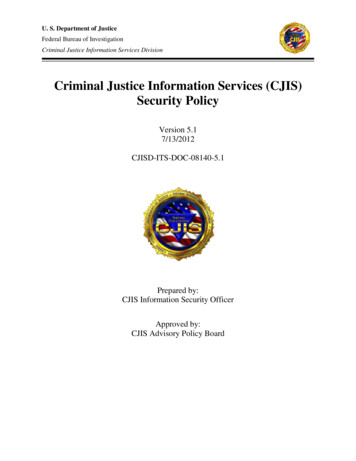
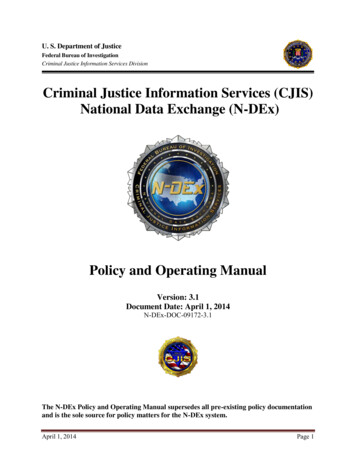
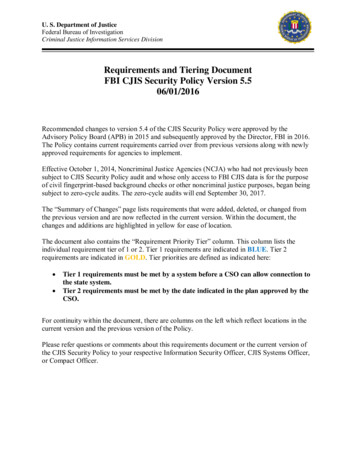
![Security Awareness Training 2015 Level I (002) [Read-Only]](/img/31/cogenttraininglevel1.jpg)
